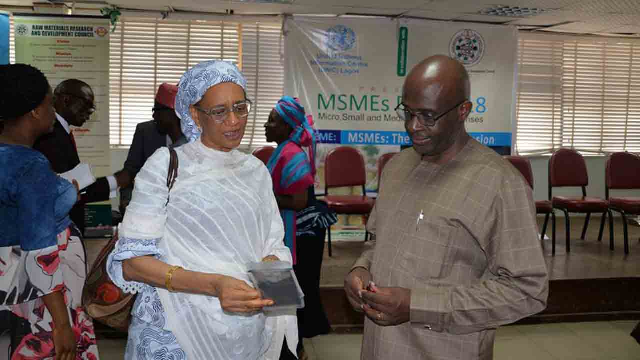If small and medium scale enterprises (SMEs) are to be rated as the wheels of every economy and Alawiye-Adams Adewale (Ph.D) and others argue that 96 per cent of all businesses in Nigeria are SMEs compared to 53 per cent in the US and 65 per cent in Europe, then the nation’s journey to economic revival and survival, is quite a distance.
This conclusion is predicated on various challenges that have over the years, been the stumbling block to the development and growth of small and middle range businesses. Besides the fact that Nigeria is a mono-economy, resourced by crude oil, there are a number of major obstacles facing these critical growth agents. They include lack of access to credit, decayed infrastructure as well as the headache of insecurity among other difficulties.
Many administrations since the 1970s, have developed quite a number of strategies, programmes and promises to make this very critical sector work, but in all, the outcomes have been less than ideal. And if the huge percentage falls under MSMEs, then the proportion of the entire nation’s populace left stranded, is better imagined. This excludes the completely jobless, and the underemployed.
Available statistics from the World Bank however, indicate that about 70 per cent of Nigeria’s estimated 150 million people live on about $1 per day. This means that about 105 million Nigerians live below the poverty line, with 35 per cent of this number classified as living in absolute poverty.
There may be some hope around the corner as it has been reported that the present administration led by President Muhammadu Buhari has commenced a series of MSME clinics around the country. For instance, the Vice President, Professor Yemi Osinbajo, recently flagged-off the exercise in Abuja. The effort is structured to focus on finding a one-stop-shop which addresses different challenges confronting this critical sector. And the move is to bridge the information gap between the Authorities and MSMEs with the aim of encouraging small businesses to be more efficient and capable of competing at the global level. Though many would say, let this charity begin at home whereby these small businesses are seen to have successfully taken-off properly, with some breath of life, competing among one another locally, the effort of the government should not be disregarded.
Championed by the Corporate Affairs Commission (CAC), with a number of government agencies such as: Nigerian Investment Promotion Council (NIPC), Nigerian Export Promotion Council(NEPC), Small and Medium Enterprise Development Agency (SMEDAN), FIRS, BoI, Customs, Ministry of Trade and Investment, among many others. These agencies are getting mobilised to ensure the agenda delivers its objectives. It is imperative also to note that this strategic initiative is being organised in 21 cities across the six geo-political zones of the federation.
Due for quality applause for waking up to full consciousness of the fact that total hope on oil is not sustainable, the government is indeed not pretending about the fact that agriculture value chains and manufacturing, (largely MSME segments), are the way to go. Credit goes to the Bank of Industry and indeed the Central Bank of Nigeria (CBN) who are taking the frontline in this call. The CBN in August 2013, launched the MSME Development Fund with a share capital of N220 billion. The Fund was said to have been established in recognition of the significant contributions of the Micro, Small and Medium Enterprises (MSME) sub-sector to the economy and the existing huge financing gap.
While the weight of today’s global economic downturn is an issue, the fall of the Naira, flight of the Dollar, crash of oil price alongside certain government policies are taken for granted as paths Nigerian banks currently pass-through, the need to strengthen the struggling MSMEs has become very inevitable. While many Nigerian banks are making an effort, the input of leader lender, First City Monument Bank (FCMB), comes to mind. The establishment has taken financial intermediation to this key sector of the economy as one of its operational areas of strength. This can be buttressed by the fact that the bank’s intervention has resulted in better access to financial resources by needy individuals, women owned firms and empowerment outfits as well as small and medium scale businesses and organisations.
The bank has continued to deepen its support to Small and Medium Scale Enterprises (SMEs) in Nigeria by disbursing over N3billion to such businesses in the last 18 months. This development has led to an increase in the number of SME operators that have benefitted from the funding support of the bank across the country. The lender is one of the top participating banks appointed by the Central Bank of Nigeria to drive the N220billion Development Fund instituted by the apex regulatory body to provide loans to SMEs.
It is also known that beyond the funding, FCMB has put in place various initiatives and capacity building programmes that have fast-tracked the growth of SMEs, thereby up-scaling their contributions to the development of the country. Apart from training sessions organised for owners of SMEs, the bank has brought its professional expertise closer to the people by having dedicated Loan Officers at some of its branches nationwide. These officers are trained and equipped to provide SMEs with the best and most effective advice and support.
In addition, its management has established an empowerment programme, called Cluster Marketing, for operators of SMEs. The initiative was designed to enhance their financial, marketing and management skills. In the same vein, the bank has continued to aggressively support women managed businesses in line with the MSME fund scheme by collaborating with women involved in SMEs for the provision of funding, sponsorship and advisory services. These interventions, the statement explained, are in line with the bank’s value as a helpful bank committed to enhancing the growth and achievement of the personal and business aspirations of its customers and the nation in general.
Speaking on the giant strides of FCMB in the MSMEs space, the Bank’s Divisional Head, Retail, Mr. Olu Akanmu, said, ‘’SMEs are the bedrock of any country’s economic development. It can hardly make good progress except the SMEs excel. Therefore, being a forward looking bank with the appropriate desire for growth, we have decided to provide this sector with maximum support’. He reiterated the commitment of First City Monument Bank (FCMB) to support its customers who are operating in the SMEs space to overcome the challenges they usually face, especially at the take-off stage, ‘’because we want to be part of their success story’’.
Mr. Akanmu advised SMEs to re-examine their operations and effectively position themselves to take advantage of the opportunities within the country. According to him, ‘’there are huge intervention funds from both government and multi-national agencies focused on supporting SMEs. Some are focused on helping with affordability, in other words reducing the cost of borrowing, while others are focused on accessibility, in other words helping to mitigate those risks that make small and medium scale businesses fail credit acceptance tests or requirements. Unfortunately, a good number of the outfits do not know the difference and therefore adopt the same strategy for accessing both. This will rarely work’’.
FCMB has a number of value-added offerings in the SMEs segment. These include the e-invoicing platform – a unique solution designed to help businesses monitor and control their cash management, especially as it affects payments, receivables, reconciliations and other financial transactions, through the internet and other mobile channels among others. Given the current state of the nation’s economy, the need to effectively support micro, small and medium scale businesses and the informal sector generally, should be faced with the highest level of commitment, by both the public and private sectors.













